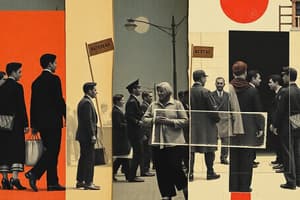Podcast
Questions and Answers
Which of the following best describes the main focus of political literature?
Which of the following best describes the main focus of political literature?
- Promoting environmental conservation
- Depicting historical events
- Addressing issues related to governance and power dynamics (correct)
- Exploring themes of love and friendship
In Charles Dickens' Oliver Twist, what social issue is portrayed?
In Charles Dickens' Oliver Twist, what social issue is portrayed?
- The struggles of working-class children in Victorian England (correct)
- The challenges of interstellar travel
- The exploration of extraterrestrial life
- The life of aristocrats in 19th-century France
Which author is known for advocating individualism and free markets through their literary works?
Which author is known for advocating individualism and free markets through their literary works?
- George Orwell
- Ernest Hemingway
- Ayn Rand (correct)
- Thomas More
What is a prominent theme in Ernest Hemingway's The Sun Also Rises?
What is a prominent theme in Ernest Hemingway's The Sun Also Rises?
Which work critiques totalitarianism and propaganda?
Which work critiques totalitarianism and propaganda?
What do identity politics revolve around?
What do identity politics revolve around?
How does literature contribute to expressing marginalized voices?
How does literature contribute to expressing marginalized voices?
What is the significance of Richard Wright's novel 'Native Son'?
What is the significance of Richard Wright's novel 'Native Son'?
How can literature help readers resist manipulation from propaganda?
How can literature help readers resist manipulation from propaganda?
What role can literature play in engaging with sociopolitical concepts?
What role can literature play in engaging with sociopolitical concepts?
Study Notes
Introduction
Literature has been used throughout history as a tool of social commentary, cultural expression, and political discourse. It can reflect societal norms, challenge them, or offer alternative perspectives on how society functions. This essay will explore some key sociopolitical concepts that have been explored through literature and discuss their significance in shaping our understanding of the world around us.
Political Literature
Political literature is a genre that directly addresses issues related to governance, power dynamics, and the political landscape. It often challenges established ideologies, proposes new systems, or critiques existing ones. Prominent examples include works by authors like Ayn Rand, whose novels such as Atlas Shrugged and Anthem advocate for individualism and free markets, and George Orwell's dystopian novella 1984 which critiques totalitarianism and propaganda. Other notable titles include Thomas More's Utopia and Niccolò Machiavelli's The Prince, both influencing modern politics and government.
Social Class and Inequality
Social class and inequality are central themes in many literary works. For instance, Charles Dickens' Oliver Twist portrays the plight of working-class children in Victorian England, while Ernest Hemingway's The Sun Also Rises explores the difference between the American expatriate community in Paris and the ordinary French people. These stories highlight the disparities between classes and the effects of economic inequality on individuals and societies.
Identity Politics and Cultural Expression
Identity politics revolve around the experiences, concerns, and interests of different social groups based on factors like race, ethnicity, gender, sexual orientation, and ability. Literature plays a crucial role in expressing these identities and narrating diverse experiences. Margaret Atwood's The Handmaid's Tale, for example, reflects feminist concerns within a dystopian setting. Similarly, Native American author Louise Erdrich writes about her culture's struggle against assimilation in novels like The Beet Queen and Love Medicine. These works serve as powerful vehicles for marginalized voices to assert themselves and bring attention to overlooked realities.
Ideology and Propaganda
Ideologies and propaganda are closely linked to politics, as they influence the way people think and act. In Richard Wright's novel Native Son, African American protagonist Bigger Thomas struggles with his identity and the impact of racism on his life. By presenting different viewpoints and exploring complex issues, literature can help readers understand various interpretations of reality and resist manipulation from those who would use propaganda to control public perception.
In conclusion, literature offers a unique platform to engage with sociopolitical concepts. Through its narrative power and capacity to generate empathy, it can inspire change, provoke thought, and foster critical reflection on the complexities of human existence.
Studying That Suits You
Use AI to generate personalized quizzes and flashcards to suit your learning preferences.
Description
Test your knowledge on sociopolitical themes depicted in literature, from political ideologies to social class issues and identity politics. This quiz will challenge your understanding of how literature reflects and critiques societal norms, political systems, and power dynamics.



